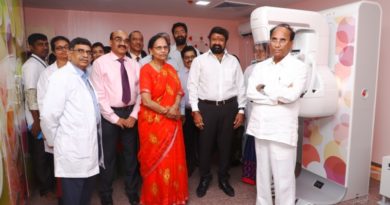One of the rare headache disorders: 1 in lakh
A 35-year-old Omani woman Mrs. Fariyal Yusuf, teacher by occupation, complained of a recurrent headache since childhood was successfully treated at Wockhardt hospital, Mumbai Central. In the month of October’2018 she had visited hospital with complaints of throbbing headaches associated with nausea, occasional vomiting and intolerance to light and sound. Her symptoms were suggestive of Migraine, however recent change in character as well as the intensity and frequency of headaches raised the possibility of headaches due to increased intracranial pressure. The clinical suspicion was confirmed when her Cerebrospinal fluid (CSF) pressure was measured; she was successfully managed for the increased CSF pressure.
Mrs. Fariyal Yusuf had been troubled by headaches since childhood but wasn’t properly evaluated or treated. As she grew up, the episodes of headache increased, and this made her life miserable. As she was a teacher by occupation, the troublesome headaches made her difficult for her to conduct teaching sessions, sometimes stopping the classes in between. Also, she became irritable and short tempered which affected her personal life. Lately she had been consuming 3-4 analgesics daily to get rid of those nagging headaches resulting in medication overuse headache.
Mrs Fariyal Yusuf had previously consulted at Oman with little relief in her symptoms. As there was significant worsening in symptoms, her daily routine was affected and with no benefit from the medications tried in home country, she decided to take consultation at Wockhardt hospital, Mumbai Central. Although her initial headaches were Migraine which had been complicated by frequent daily usage of analgesics (Medication overuse headache), she developed new symptoms in the last few months; she complained of ringing sensation in ears which disturbed her sleep, she also complained of intermittent double vision and transient visual obscuration during headache episodes. The recent change in the nature of headache as well as new accompanying symptoms raised the possibility of increased intracranial pressure.
She was investigated for her symptoms. On clinical evaluation, apart from being overweight with a BMI of 28kg/m2, rest of the examination was normal. She also underwent a thorough ophthalmic check-up which was unremarkable. Her MRI (brain) including an assessment of the blood vessels supplying the brain did not reveal any significant abnormality apart from tortuosity of optic nerves which was indirect evidence of raised intracranial pressure. She underwent therapeutic CSF tap and was started on medicines to lower CSF pressure along with advice to reduce her weight.
Above evaluation confirmed that she was suffering from Idiopathic intracranial hypertension (IIH) a disorder of unknown etiology that predominantly affects obese women of childbearing age. The annual incidence of IIH is 1 to 2 per 100,000 population. Though a relatively uncommon form of headache but if undiagnosed, the disabling headaches accompanying the disorder not only affect the daily routine but untreated IIH can result in permanent visual impairment. An unusual finding in this case was that IIH usually results in swelling of optic discs which wasn’t seen in this particular case.
Dr Prashant Makhija, Consultant Neurologist Wockhardt Hospital Mumbai Central says, “ A timely intervention helped this woman to get back on track or else there could have been permanent vision loss due to the pressure on the optic nerve. After the excess CSF was removed, the woman felt better. The lady is still on follow-up for the last 8 months, and hasn’t required analgesics after she was treated. There is no headache or visual obscuration, tinnitus (the ringing of the ears) is reduced to 80%, and she is able to sleep peacefully now. She has also lost 6 kgs which further helped in reducing CSF pressure.”
Mrs Fariyal Yusuf, a patient, said, “Since childhood itself, I experienced headaches, which deteriorated my health and reduced my quality of life. I was unable to concentrate on my studies while I was in the school and found it difficult to do my daily chores. Once I grew up, I couldn’t focus on my work, and this lowered my productivity. I used to get anxious, depressed and upset. I tried many medications but they failed to help me get relief. Finally, I could start the new innings of my life with the help of Wockhardt hospital. I thank the hospital for helping me to live the life the way I want too.”




